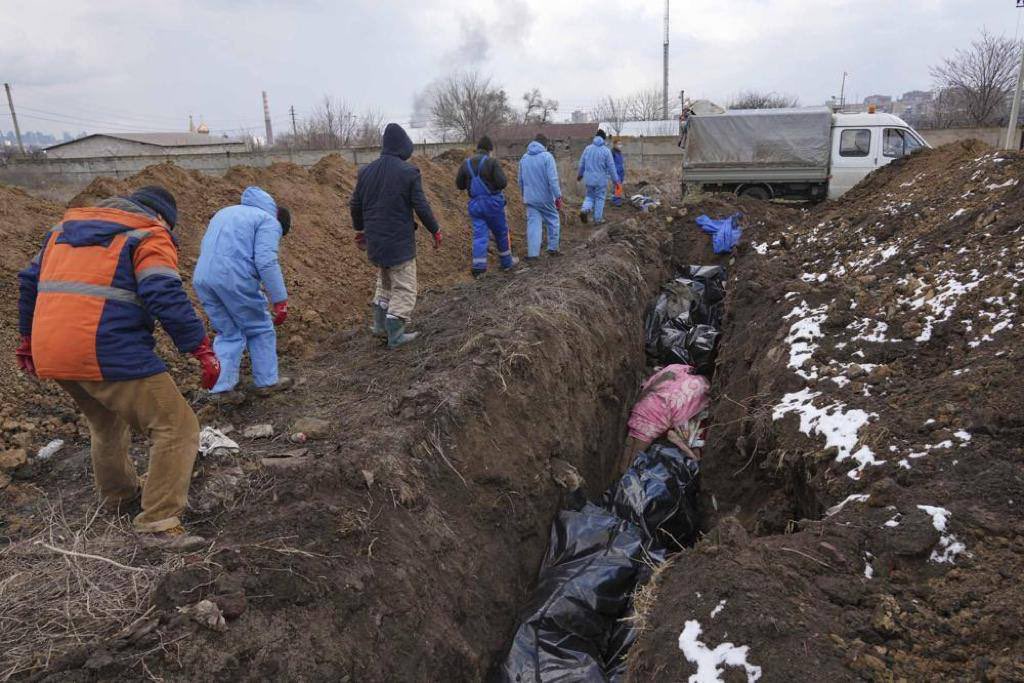The murderous destruction of hospitals by Russian missiles is the latest horror to be added to the wider attacks on civilians and the streams of refugee from Ukraine (the photo is of victims being buried in a Mariupol mass grave).
This will be a series of disparate notes selectively drawn from the media coverage available in a town just north of Bucharest – starting with a comment about that media coverage and the skilful use being made by Ukrainian authorities (including an interview with a Russian POW); then asking whether aggression every works and what we really know about Ukraine; and finishing with an important discussion now underway about realism in politics.
Media Coverage
Shaun Walker is typical of the thousands of journalists now posting from the country - although today he crossed into Romania with useful tweets. Simon Wren-Lewis is an Economics academic whose blog strays into the political field and makes a useful point in his latest point
Contrast public perception in the UK of Putin’s invasion of Ukraine with the US and UK invasion of Iraq. There is, rightly, no attempt to balance the reality of what is going on in Ukraine with Putin’s propaganda. National self-determination for Ukraine is being overridden by the use of lethal force based on the fantasies of empire by one man, or a small group of men around him. But the reality of the Iraq war was not so different. The invasion was the project of one man, George Bush, or a small group of men around him, with the UK following because our Prime Minister thought he should.
Yet with Iraq public perceptions were different, because the misinformation was coming from our own governments. We were told there were stocks of chemical weapons that could be used against us, or at least our allies, whereas in reality there were no chemical weapons. The bigger lie in the US was that Iraq was somehow linked to Al-Qaeda, whereas anyone with any knowledge knew that this was nonsense. We were freeing Iraq from a tyrant, whereas in reality we were undertaking a national rebuilding process with little idea of how to go about it, with what turned out to be disastrous consequences.
This post from Chris Hedges
about “worthy
and unworthy victims” extends the point.
India has adopted a neutral position on the war and this piece is therefore of interest.
A Russian POW and the Ukraine President tell it as it is
Aggression doesn’t pay
You would have thought that, after the disastrous Russian and US invasions of Afghanistan, US and UK invasions of Iraq, Libya etc, the very idea of invading another country would have been laughed out of court. Was it just nationalistic groupthink?
But it all depends
If this
article is typical of thinking in western newsrooms, it shows how deranged
we have become
This is UK military analyst Lawrence Freedman’s latest assessment - and one from the US stable.
What about Negotiation?
https://www.globalpolicyjournal.com/blog/01/03/2022/diplomatic-solution-ukraine-crisis
https://www.theguardian.com/commentisfree/2022/mar/04/what-would-ukraine-russia-peace-deal-look-like a very recent article from Anatol Lieven
https://theconversation.com/ukraine-what-will-end-the-war-heres-what-research-says-178721
Understanding Ukraine
This series of posts has
already referenced a couple of important books for understanding the conflict –
Ukraine
and the art of strategy; Lawrence Freedman (2019) and Ukraine
and Russia – from civilised divorce to uncivil war Paul d’Anieri (2019)
I have just come across a small collection of open access books on the region and downloaded three of them – one being a fascinating memoir from an English historian (now resident in Canada) who has made Ukraine. Russia and Belarus his specialities – it’s “Understanding Ukraine and Belarus” by David Marples.
An important debate about Realism in international relations
https://www.newstatesman.com/ideas/2022/03/john-mearsheimer-and-the-dark-origins-of-realism
https://adamtooze.substack.com/p/chartbook-95-is-ukraine-the-wests?s=r

